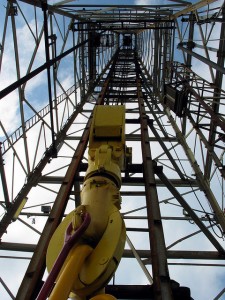
Video games may have a earned a reputation for encouraging unproductive behaviors, but companies like Siemens and Louisiana Immersive Technology Enterprise are reversing this stigma. Their latest technology uses video game-like virtual simulations to train and instruct oil-field workers.
Simulations have been proven to familiarize subjects with their upcoming working environment, as well as reducing accidents and quickening response times. While a virtual simulation can never compare to hands-on experience, they do present a step above traditionally passive classroom learning techniques. These training programs so far appear to be much more effective than lectures, PowerPoint presentations or videos.
A Virtual Legacy
Virtual reality has long been used to help train employees for highly-specialized and technical careers. Computer-based flight simulators have been in use since the 1980s, and they are implemented by organizations such as the Air Force and NASA. Tank drivers similarly use a simulated cockpit and digital display to learn how to operate their vehicles during combat missions.
In fact, the military has been an early adopter in using computer-based training in lieu of costly and time-consuming field exercises. The latest technology has combat training missions that are recreated in a virtual environment using a VR headset, a “gun” prop and specialized clothing that tracks motion data. Operatives typically undergo repetition for simulated “missions” in a variety of settings.
These sessions are accompanied by field training and live ammunition exercises, but the initial “game” like simulations have been able to reduce costs while allowing personnel to learn and become familiar with a variety of field situations.
Virtual Drilling and Drilling Rigs
Oil companies and their equipment suppliers are tapping into this reserve of functional simulation exercises. Frank’s International is a company that specializes in oil field tubular distribution and installation. They have contracted Louisiana Immersive Technology Enterprise (LITE) to produce a “game” for that could simulate the deck and interior equipment of an oil rig. Trainees get to experience instruction on rules, procedures and general safety through a virtual environment.
Training for a Safer Industry
These advancements have been made for good reasons. According to the US’s Bureau of Labor Statistics, the oil and gas extraction industry has a fatality rate eight times higher than any other US industry. The numbers equate to 3.2 deaths per 100,000 workers.
Industry experts hope that virtual training will help reduce the overall number of incidents. The results so far look promising. Frank’s International training director Jacke West feels that compared to other forms of classroom learning, simulations provide a more direct, “hands on” experience. Trainees get to log far more hours performing similar tasks to what they will see in the field than if they had been sitting in a chair watching a slide presentation.
This type of training is vital for preventing the types of accidents that lead to catastrophic disasters, not to mention fatalities. Training director of global energy company Total E&P Nicolas Tarisse proclaims that, “only intensive training can ensure that our employees can respond correctly to dangerous situations.”
Best of all, virtual environments allow for training even while a rig is being constructed.
Other Virtual Applications
Virtual reality simulations have also begun to be used during the rig building process. Engineers and designers get to explore a digital version of the oil rigs and equipment. During the planning process, these virtual “walk throughs” help construction and design crews get a better idea of what to expect from a build.
3D virtual models have begun to help companies keep up with documentation. The huge amount of complex data can be tied to their virtual counterparts, such as a pipe being able to display exactly how much pressure it can handle. All the engineer has to do is “walk” up to the model of the pipe and click to see more information.
Applications like this help anticipate problems and plan for maintenance well in advance of a project being completed. Thanks to these advances, the oil industry can be made safer and more efficient for everyone involved.
For those currently working in the energy industry both domestically and abroad, having reliable, high-quality equipment is just as vital as having the proper training to operate it. Take a look at our swab rigs and other well equipment to find out how we can help your operation.